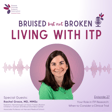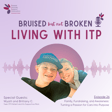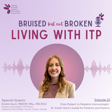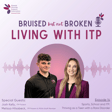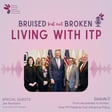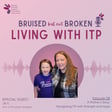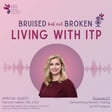Become a Creator today!Start creating today - Share your story with the world!
Start for free
00:00:00
00:00:01

ITP and Pregnancy: What You Need to Know Before, During, and After
Pregnancy with ITP can feel overwhelming—but it doesn’t have to be. In this episode of Bruised but Not Broken: Living with ITP, two leading experts—Dr. Terry Gernsheimer and Dr. Edith Cheng—share what women with ITP need to know before, during, and after pregnancy. From coordinating care between hematologists and obstetricians to understanding delivery options and postpartum concerns, this conversation is packed with reassurance, real-world examples, and actionable guidance. Whether you're planning a pregnancy or already expecting, this episode offers clarity, confidence, and hope.
PDSA Resources:
Transcript
Introduction & Host Introduction
00:00:00
Speaker
there are obstetricians who are expert in this and we're going to work with that person. So that's, I think, really the first thing to give somebody some confidence that this is going to be okay.
00:00:11
Speaker
I think the other thing is I've been doing this with Dr. Chang for, i I don't want to tell you how many decades, but I can tell you that, you know, I can, it won't even cover one hand to tell you when we've had problems and ever said, oh, please don't do that again.
00:00:27
Speaker
And certainly, i can't remember a patient who didn't get through safely, both mom and baby. Welcome to the PDSA podcast, Bruised But Not Broken, Living with ITP.
00:00:42
Speaker
welcome to the pdsa podcast bruised but not broken living with itp The diagnosis of a bleeding disorder like immune thrombocytopenia may leave you wondering, how can I really live my life with ITP?
00:00:56
Speaker
PDSA's podcast, Bruised But Not Broken, Living With ITP, brings empowering stories, the latest research and treatment updates, lifestyle tips, and answers to the real-life questions the ITP community is asking.
00:01:11
Speaker
Here's your host for this episode, Barbara Pruitt.
ITP & Pregnancy Coordination
00:01:22
Speaker
Pregnancy and ITP is a big concern for any woman of childbearing age that has ITP. One thing that is clear is if you have ITP and you're planning on becoming pregnant, you need to have your hematologist and your obstetrician coordinate your care during pregnancy.
00:01:43
Speaker
That is why we have two very special guests today to talk about that coordination of care. Our first guest may be familiar to you, um Dr. Terri Gernshimer.
00:01:57
Speaker
She is a professor emeritus of hematology at the University of Washington School of Medicine. Her research focuses on pathophysiology and the treatment of immune platelet disorders and pathologic immune responses associated with transfusions.
00:02:15
Speaker
She has clinical research interest in transfusion management of hemopoietic stem cell transplant and surgical bleeding in patients undergoing solid organ transplant and cardiovascular procedures.
00:02:30
Speaker
She's made significant contributions towards understanding the pathophysiology and the management of ITP, and she wrote the guidelines on ITP in pregnancy.
00:02:42
Speaker
Thank you so much for being with us today, Dr. Gernshimer. Good morning. Nice to be with you. Also joining us today is Dr. Edith Chang.
00:02:54
Speaker
She is the medical director of perinatal genetics and is a professor of maternal fetal medicine and chief of service for obstetrics at the University of Washington School of Medicine.
Expert Collaboration & Guidance
00:03:08
Speaker
She also serves as a professor of medicine in the Division of Medical Genetics. Dr. Chang is recognized for her leadership and commitment to advancing maternal and fetal health through both clinical care and academic excellence.
00:03:27
Speaker
Welcome, Dr. Chang. Hello, thank you for inviting me. Glad to be here. Well, we are honored to have both of you here today. I know both of you have very busy schedules and it's wonderful that you've taken the time to be with us today.
00:03:43
Speaker
I understand that the two of you have also collaborated on quite a few ITP pregnancies, is that right? That certainly is. yeah Well, that's definitely what's needed.
00:03:56
Speaker
So let's go ahead and get into this. Dr. Gernsheimer, if you have a patient with ITP who's considering getting pregnant,
00:04:07
Speaker
Do you ask them who their obstetrician is or do you guide them to an obstetrician that you've worked with before? How do you handle that? Well, obviously I often guide them to Dr. Chang. That's why why we were giggling about that.
00:04:23
Speaker
I think one of the first things I do say is we've got to have you work with an obstetrician who has experience in this. And most importantly, who is willing to collaborate with your hematologist?
00:04:39
Speaker
You know, part of the problem can sometimes be that someone is in an area that doesn't have what we call high risk obstetrical care.
00:04:51
Speaker
um Right. That doesn't mean that your obstetrician can't also consult. Right. with someone who has high risk, who does high risk
Telemedicine & Patient Care
00:05:00
Speaker
obstetrical care. And I know, for example, Dr. Chang and her colleagues go out to areas in other parts of Washington state where that kind of care doesn't exist.
00:05:12
Speaker
And they work with those obstetricians and sometimes bring them in the the late period of um getting ready for delivery back in. But I mean, I think that whole period needs to be a coordination of care.
00:05:27
Speaker
So that that coordination, Dr. Chang, is done remotely when you when there's a patient that's not close by. You coordinate the care with them by telephone? do you how how do you How do you coordinate that?
00:05:43
Speaker
Yeah, it's really great. I think that, um to Dr. Gernshimer's point, the care and consistency of care for mother and baby really um requires coordination.
00:05:54
Speaker
And these days with telemedicine, it no longer, ah the reach and and the coordination and communication is so much more fluid, right? And it's patient-centered because we don't, as a representative University of Washington, we provide consultative care to the WAMI region.
00:06:12
Speaker
And so again, as Dr. Gernheimer alluded to, our reach is to all corners of the state of Washington and the Wyoming region. So i think that telemedicine has been an an enormous gift to us, but most importantly for the patients.
00:06:28
Speaker
So oftentimes what will happen is that, as Dr. Gernheimer said, you know there'll be a hematologist locally, works with an obstetrician. Obstetrician reaches out to us. And we are then able to have almost a four-way connection with the patient, right, through telemedicine.
00:06:44
Speaker
And then we can consult with the patient through telemedicine without having the patient driving all the way over to Seattle. And sometimes that care throughout the pregnancy is coordinated so that the patient can actually deliver safely in her community.
00:06:59
Speaker
um So again, the right place for the right patient. and you know safe And the correct, the right advice too from experts that know what they're dealing with here.
00:07:10
Speaker
So what kind of advice do you give an expectant mother who's feeling very anxious about ITP and a pregnancy? I know I've been through this, so I know that there is anxiety related to it. Mine was a long time ago, but how do you try to calm them down or reassure them? This this is for both of you to...
00:07:32
Speaker
So I'll start from the hematology side because it's probably a patient. um I'm going to assume it's patient who already had knew she had ITP and we're already working together.
00:07:43
Speaker
And I think um as we were talking about, one of the first things to do is to be able to say there are obstetricians who are expert in this and we're going to work with that person. So that's, I think, really the first thing to to give somebody some confidence that this is going to be okay.
00:08:01
Speaker
I think the other thing is, you know, I've i've been doing this with Dr. Chang for, i I don't want to tell you how many decades, but I can tell you that, you know, I can, it won't even cover one hand to tell you when we've had problems and ever said, oh, please don't do that again.
00:08:18
Speaker
And certainly i can't remember a patient who didn't get through safely, both mom and baby.
Delivery Options & Platelet Management
00:08:24
Speaker
So I think that's the first thing to assure someone of is we're going to we're going to get through this. We'll all get through this together.
00:08:32
Speaker
Edith, you want to comment on that? Yeah, I agree. i agree. And so, you know, for Terry and i the first thing is the earlier, the better in your pregnancy to seek consultation.
00:08:44
Speaker
So maternal fetal medicine, obviously we can't be everywhere and we don't expect the patients to come to see us. And that's why the telemedicine works, right? Her OB can connect with us. The patient connect can connect with us independently. by So the earlier in pregnancy, the better.
00:09:02
Speaker
And I think that's probably the most important thing. The other question that I often get and Terry gets to is, have you ever seen this before? you take Yeah, all the time.
00:09:14
Speaker
And on the one hand, I want to say, no, you're not special. But on the other, it's like we do this a lot. And so we're comfortable and confident and be able to, you know, take you through your pregnancy safely.
00:09:30
Speaker
Well, that's something that's really important for the patient to feel confident in the care that they're receiving. And just to hear the two of you talking, I mean, I would definitely feel confident with both of you on my side.
00:09:43
Speaker
I think one of the important, because you immediately once you're pregnant, you immediately become a mom. And by that, I mean that you start thinking of your baby first. And so the question I frequently get is, is my baby going to be okay?
00:09:58
Speaker
Right. And so I think that that is one of the first things I also say is, and your baby's going to be just fine. Good. that That is a big concern.
00:10:09
Speaker
what What are some of the other concerns that your patients have? talk to you about that, you know, you have to deal with these questions that they have? You know, from the OB side, you know, one is for sure knowing that I know your hematologist or I'm working with your hematologist and that we are always in close communication. That's number one.
00:10:31
Speaker
Number two is if I am not the primary and I am the MFM consult, yes, I am going to be, or I know you're, and you know, I will be talking to your OB. We are So I think that the patient, it's important for the patient, if there are several people taking care of that patient, that the patient feels that we are fluid ah in our communication with each other, right?
00:10:55
Speaker
That we are really, although we may be three or four um specialists, we are one um in our voice and taking care of. I mean, that goes a long way. that's that's That's really important.
00:11:06
Speaker
To know that you're all on the same page. yeah You're all working for the same goal, a safe delivery and a healthy baby and mom. Exactly. yeah Exactly. Yeah.
00:11:17
Speaker
Do women, I'm sure they express concern about, should I have a vaginal delivery or a C-section? i I'm sure there's lots of questions around that. What do you, um and every patient is different.
00:11:31
Speaker
I understand that. And every case is different. So you can't, I know you can't necessarily say, oh, well, this is what we you have to do because every there's always variables. so But what what would you tell an expectant mom about that choice or those options?
00:11:48
Speaker
My favorite thing is that there are really only three reasons for C-sections. three medical reasons for C-section. One is basically that the baby isn't cooperating and it isn't presenting itself as head first.
00:12:02
Speaker
Number two is that the labor does not progress and cervical dilation is stalled ah in spite of all of the best and safe efforts to support further labor know, there's further, you know, so it's what we call a rest of labor.
00:12:19
Speaker
And then the third is fetal distress, meaning that labor is actually progressing, cervix is dilating, but the baby doesn't like it. So I think that for somebody with ITP, I guess the question really is there's some people kind of say, oh my gosh, I can't have a C-section because I'll bleed and hemorrhage.
00:12:37
Speaker
or i have ITP and it's safer for me to have a C-section, right? So it can go either way. So i usually start with that. And I usually just kind of say, you know, your pregnancy will be taken care of and we will proceed with, you know, labor and delivery as medically indicated.
00:12:57
Speaker
Okay. ah You know, and i I think as a hematologist before They even get there to that discussion with their obstetrician. Hopefully I've already said to them, your delivery will be based on obstetrical indications and your ITP is not going to interfere with that either way. We can support you.
00:13:19
Speaker
however we need to through either a C-section or a vaginal delivery. And in fact, I have to say, I've seen Dr. Chang deliver a baby at 20,000 platelet counts where everybody would say, oh my goodness, you can't do this. And baby and mom were absolutely fine after a vaginal delivery. So, you know, it it's, I think it would have been harder on us to actually go for a C-section at that point and for us to try and deal with somebody who now has a surgical wound.
Anesthesia & Decision-Making
00:13:52
Speaker
So, you know, again, that's what I should be telling mom is we'll support you whatever the ah obstetrician decides. Yeah, that's a really important point because, you know, if we do need to go to C-section, that's, that's you know, what Dr. Gernheimer said was absolutely critical because then, you know,
00:14:09
Speaker
it the natural response is, oh my gosh, I have a bleeding disorder. You're going to take me to surgery and I'm going to bleed and I'm going to have these complications. But the whole point with partnering with Dr. Gernheimer and or hematologist is to say, we are going to get you through. it We are going to give you whatever you need, right? To clot appropriately and safely. So that's, you know, I think that that's number one.
00:14:35
Speaker
i do think to follow up on that question about delivery is, the The elephant in the room in terms of labor and delivery is anesthesia. And I know that you sort of alluded to that earlier.
00:14:48
Speaker
and it is a comp it is a complicated question. Dr. Gernshimer and I have gone through that a lot with a lot of patients. and And we have to bring in our OB anesthesiologists to partner in discussion of safety of what we call neuroaxial or you know regional anesthesia, you know an epidural.
00:15:10
Speaker
Right. And spinal anesthesia is another thing that I think that's pretty much avoided, isn't it? but No, no, no, no. It's not necessarily. yeah And this, if things get complicated and it's really important for people to understand this because There are guidelines. so you know, anesthesiologists understandably are very risk averse.
00:15:33
Speaker
And then when we start talking about moms and babies, people are real sensitive about do no harm. But at the same time, if you have a mom who's in a lot of distress that isn't necessarily not doing any harm either.
00:15:49
Speaker
And i I think we can, there are numbers that are published out there as to when it is safe to do a so ah spinal injection, at what platelet count, at what platelet count can one safely do an epidural.
00:16:04
Speaker
And that needs to be discussed way ahead of time with the anesthesia team and the hematologist and the it obstetrician. And if we have an anesthesiologist who is uncomfortable giving them the documentation that maybe they'll feel more comfortable having in order to proceed if the count is not, you know, where they think it should be.
00:16:28
Speaker
Where they're comfortable with. Yeah. Right. So general anesthesia is just used for, i guess, a C-section then? Yeah, correct. so so So the next extension to that conversation is, okay, Dr. Chang, you just told me that it was actually safer for me to have a vaginal delivery to labor and vag, but you're now telling me that Dr. Gernheimer and you, you're telling me that there's some concerns about whether my platelet count is high enough to safely have regional anesthesia, right?
00:16:59
Speaker
And regional anesthesia, so we use the term regional because it's more general. its It encompasses both epidural and spinal. That's really the next logical question. And so what happens is that OB anesthesiologists and or anesthesiologists who sort of have a little bit more experience with our ITP pregnancies, we have IV or peripheral ah medication um that's very fast acting, pain management medications that we can actually give mom through the IV during her labor.
00:17:34
Speaker
to help manage the ah the contractions. it's not as It's definitely not as good as a regional anesthesia. Definitely not.
00:17:45
Speaker
And because they're fast acting narcotics, the risk to the fetus is very low to see that. And so that's a good thing. But the other thing is that because they're fast acting, they have to be on continuous infusion and it doesn't work as well.
00:17:59
Speaker
So that's the trade off. And we begin that conversation with our patients if Dr. Gernsheimer and I think that her platelet count might not be high enough to safely have um regional anesthesia.
00:18:15
Speaker
So to continue that, then she's going to say, okay, well, I don't know that i want to do that, but then the only way that I can completely be pain free is to have a C-section and my choice going to be general anesthesia.
00:18:34
Speaker
Yeah. These are real life conversations. Right. I'm sure you have to have them. And and the sooner the better, because exactly if you have have a plan in place, then you know what's going to happen and you're not as anxious about the whole scenario.
00:18:50
Speaker
And things can always go left or right and you might need to make adjustments. But as long as you've had these deep conversations ahead time, it's going to take some of the anxiety off of you as as the pregnant woman.
00:19:04
Speaker
Yeah. I mean, thing Terry, I think you and I have shared a handful of patients where they've chosen that route and say, you know, I would rather have general anesthesia because you can support me with, you know, platelets, et cetera, to control my risk for hemorrhage um because I don't want to go the other route.
00:19:26
Speaker
And, you know, it it's not that as as long as I think we're talking about the patient being safe, it's not for me to make that decision for her. It may, you know, whether or not that's what I would choose.
Medication Impact & Research
00:19:41
Speaker
You know, we I think it and we've said this about ITP many times and and the treatment of ITP, you lay out all the options and you tell the people that you're talking to the pluses and the minuses. And in the end, it has to be a shared decision.
00:19:57
Speaker
Yep. Right. I know but just from my experience, which was years ago, my platelet count was 16,000 at the time of delivery. And I had,
00:20:10
Speaker
done a lot of research, had talked to doctors, you know, on the other side of the U.S. that had had experience in delivering um with low platelet counts.
00:20:22
Speaker
I was encouraged to go ahead and do have a vaginal delivery, but my fears were i didn't want to have something unexpected happen, like a vaginal tear, and I felt like a C-section for me would have been the best option because you would see the bleeding.
00:20:43
Speaker
And I know that I was transfused. That's the only time I've ever been transfused, but ended up with a very healthy baby. So, um and I was fine. So that was a decision that my obstetrician at the time had me really research and look into it all, but that was my, our decision and it worked out fine.
00:21:04
Speaker
You know, I wasn't there to see her, um when she was born because I had i had general anesthesia. And of course, they took her to the children's hospital right away because her platelet count was 16,000. But anyways, um like you said, shared decision.
00:21:22
Speaker
and and you And you've learned so much more since then. So I mean, this is old timey for me before they had had a lot of this information available. I think we're better at getting a patient prepared with a higher platelet count when delivery comes around.
00:21:40
Speaker
So we've got options to get the count most of the time into a really safe range so that that's not the issue, hopefully. went but and And as we know with ITP now, there's a lot of choices with treatment. So I understand completely what you're saying, because back in the 80s, there were very few.
00:22:02
Speaker
And um I know one of the issues that a pregnant mother would be concerned about is, are the medications that she's on, are they going to be affecting the baby and in a negative way?
00:22:15
Speaker
And I'm sure that's a big question, that there's not a lot of research done on that. Because we're so nervous about ever treating pregnant women for the reasons I said is, you know, pregnant women are are precious to everybody, you know. Right. um We've all had a mother at some point.
00:22:35
Speaker
So I think there's no question that we that there are some that um medications that we're perfectly comfortable using, but it's usually because they've just been used so long, not that research was specifically done on this population.
00:22:53
Speaker
And that's because everybody's uncomfortable doing research on pregnant women, um including the disease that developed the medication. So then what we eventually have is case reports and collections of case report series um that say, well, we treated this many patients with rituximab, for example, and this is what happened to the baby, and this is what happened to mom, and these were our outcomes for both.
00:23:23
Speaker
So yes, and I think there are some medications that we will call, you know, as much as we can, completely safe, some that are probably safe and some that we try very hard to avoid and some that are too know new and we just don't know and we really also would recommend against using them.
00:23:43
Speaker
Right, right. With ITP, we know that there's antiplatelet antibodies in your body. And I know that sometimes it can pass through the placenta into the baby, how do you handle that situation? Or how do you talk to your patients about the possibility of that happening?
00:24:01
Speaker
i mean So I have a lot of white hair. and ah and doing Same here. doing this Doing this longer than um I would like to think about. But um in, quote, the old days, we actually routinely did something called percutaneous umbilical cord blood sampling.
00:24:20
Speaker
pubs or cortisentesis at terms. So like closer 37, 38 weeks, you know, to see what the baby's platelet counts were. So because of this unknown concern that perhaps there would be risk for intracranial hemorrhage um oh for a vaginal delivery, we don't do that anymore. That was actually the Society for Maternal Fetal Medicine basically said, you know, the data that we have does not support um that the risk of a PUBS at that gestational age versus the benefit, since we didn't really have any data supporting that these kids were at increased risk for intracranial hemorrhage, at um that that should not be done. And so we stopped doing that probably 30 years ago.
00:25:10
Speaker
However, we do identify that we do know that as per what you said, your daughter had you know a platelet count of 16,000. We do know that you know, about 10% of kids do do have, babies do have thrombocytopenia. So from an obstetrical point of view, our rules for delivery management is there will be things that we wouldn't do. Like we wouldn't put a scalp electrode to monitor the baby's heartbeat because it's a clip, right? um On the baby's scalp.
00:25:40
Speaker
um We do not do assisted vaginal delivery. So we will not put forceps on and we will not put vacuum on. And so my favorite words are this baby has to slide out on its own.
00:25:52
Speaker
And then what we do is that we have we um obtain a ah some cord blood and run a CBC on the baby right away. Okay.
00:26:03
Speaker
Okay. That makes sense. I know we did get a question from social media regarding this and... Her question from Charmy was, I'd like to know the effect on the fetus when using medication to treat ITP.
00:26:20
Speaker
Can ITP be detected early on just like non-invasive prenatal testing? I think she means ITP in the baby.
00:26:31
Speaker
Yeah. In the baby. Yeah. I think we already talked about um the medications. I mean, some of these medications do cross the placenta. Some of them actually, like some of the corticosteroids might actually have late um late on in pregnancy may have a good effect on the baby if we if the baby has to come early.
Post-Birth Monitoring & Breastfeeding
00:26:51
Speaker
But you know other medications, I'd say we worry about rituximab because it does kill off lymphocytes and um the baby is dependent on mom's Number one, antibodies, the good ones as well as bad ones early on during the first few months before he or she can make their own antibodies to stay healthy.
00:27:14
Speaker
And they also might be delayed in making their own lymphocytes. So um there are medications that can affect the baby. A lot of medications can get across the placenta.
00:27:27
Speaker
But again, that being said, you know generally these things are safe I'm just following. and In terms of detecting ITP in the baby, other than looking for other kinds of genetic thrombocytopenias, inherited thrombocytopenias, there's more risk, as I think Dr. Cheng was alluding to, with doing any non-inva any invasive testing.
00:27:52
Speaker
And i quote, non-invasive testing, for example, some people would do scalp vein testing, was is inaccurate. Right. So there's no way to really know when baby's born, we're going to find out.
00:28:06
Speaker
Surprise. it be dealt with. I think the important thing is if it happens, it can be dealt with. It can be treated safely. Absolutely. Well, that's good to know.
00:28:17
Speaker
Now, when and or if the antibodies cross the placenta, they usually, my understanding and my experience is that they those antibodies are short-lived.
00:28:29
Speaker
they will die off and the baby's platelet count will then rise to a normal level. Is that still correct? Is that usually what happens? So usually. um Okay. I have seen babies who whose moms had ITP need to get treated with IVIG for four months.
00:28:55
Speaker
Because antibodies, I mean, yes, it's true. Antibodies go away. Some of these babies, within a week or so, boom, they're back. um They get one dose of IVIG.
00:29:07
Speaker
Sometimes they get transfused with platelets. If platelet can't come goes up, it never comes back down. That's the end of the story. Everybody's happy. But occasionally, these babies need repeated doses of IVIG.
00:29:20
Speaker
um I've seen it take absolute months when people and people start getting nervous, no question, and particularly in a breastfeeding mom, then the question comes up, is the mom passing antibodies by breast milk?
00:29:34
Speaker
And so I'm going to say that's rare. It's extremely rare. But I also want to make it clear that mom doesn't have to necessarily stop breastfeeding at that moment.
00:29:48
Speaker
And what we recommend, because I think this is really important, um is that mom start throwing away the breast milk, but continue to pump. To pump.
00:30:00
Speaker
If that's what she wants, okay? If that's what she wants, you can continue to pump. Let's see what happens to the baby. On formula. formula. And then um if the baby's platelet count comes up on its own, it you still don't necessarily know whether or not...
00:30:20
Speaker
that was about to just happen and it's coincidental. And so you can go back to breastfeeding and then if the baby's fine, you're home free. If not, and the platelet count drops again, then you can say, okay, I give up.
00:30:34
Speaker
But I think that whole little discussion is really important. Right. Well, if the baby's count is low at birth, and does not go up, does that tell you that the mother has an inherited thrombocytopenia as opposed to an immune thrombocytopenia?
00:30:56
Speaker
Would that be a good indication? A baby light who's got a really low platelet count at birth is um almost always gonna get transfused somewhere in there. And both are going to respond.
00:31:06
Speaker
I think at that point, that's when you might become suspicious and say, maybe we better do some further testing here. um Hopefully, somebody who has ITP, their physician their hematologist has previously looked into other family members. Do you know anybody else? I mean, there's there's what we think of as inherited ITP, but we're realizing there are so many other disorders that are inherited thrombocytopenias that hopefully that's been looked into already.
00:31:38
Speaker
Right. That's... that this new development of thinking and it's expanding the scope of a maternal thrombocytopenias in pregnancy. Because, you know, oftentimes, you know, healthy women really don't go to the doctor and they don't get a CBC. And the only time that they get a CBC is actually at their first prenatal visit.
00:32:00
Speaker
Because if they've been completely asymptomatic of anything, you know, why would,
Thrombocytopenia Variants & Monitoring
00:32:05
Speaker
right? So oftentimes we don't discover the thrombocytopenia until she presents for her first prenatal visit.
00:32:13
Speaker
So again, thinking through from being a dinosaur to more recent is the old days, it was just it was either gestational thrombocytopenia or ITP, right?
00:32:24
Speaker
Now I think for the obstetrician and clearly for the maternal fetal medicine specialist, we really have to think beyond just that. and and and think about the inheritance from the cytopenias and that your flag kind of has to go up in your brain if you go,
00:32:40
Speaker
ah take a family history, ah this platelet count just doesn't feel right. And or if there, and Dr. Gernschimer has taught me that, gosh, she's tried every single drug under the sun to bring up her platelet and it's no is' still not responding. Well, you know it not Edith, think.
00:33:02
Speaker
um you know it's not it may not be itp so edith think I think this is the scope. This is the stuff that we sort of now have to think about. This is another reason why the earlier the better to seek consultation.
00:33:17
Speaker
Right. And I know that for ITP patients, and I've had a couple of podcasts already about having um a very good family history so that you know if there's any little cracks in there that might lead you in a different direction. And then genetic testing,
00:33:35
Speaker
or whatever needs to happen to get a ah more accurate um diagnosis if it's not truly ITP. But Dr. Chang, you mentioned the the term gestational thrombocytopenia, which I've never heard those together. I've heard of gestational diabetes, but gestational thrombocytopenia. um And i know what that is um because I've had friends, daughters and stuff have thrombocytopenia only through their pregnancy, and then when they deliver, it goes away.
00:34:08
Speaker
what What's happening there? So it's an entity where we we understand that during pregnancy, in general, our white count goes up a little bit, our hematica goes down a little bit, and that we have a slight decrease in our platelets.
00:34:25
Speaker
um From the American College of OBGYN and Society Maternal-Fetal Medicine, we kind of give that label of potentially gestational thrombocytopenia when the platelet count is sort of, you know, in the 100s. You go, huh, this is... And again, same thing, healthy woman, first pregnancy, we get her first CBC, her platelet count is 133, huh?
00:34:50
Speaker
hu You know, you take a good history, blah, blah, blah, blah. And so, and if it's stable, then you kind of say, oh, she has gestational thrombocytopenia with... But there's nothing...
00:35:03
Speaker
Beyond that, there's no test or there's there isn't any test or anything that confirms that. Okay. and But would you expect that then with consecutive pregnancies with that person? Would it happen again?
00:35:16
Speaker
might. It might. And it it could just be a minimal drop, not not necessarily like down to 50,000 or something. It could just be, like you said, 130 or something.
00:35:27
Speaker
And the clue the clue would be that if it's for whatever reason related to pregnancy, postpartum, she should, you know, her platelet count should normalize.
00:35:38
Speaker
And again, we're going to go back to if this person has never, ever had a CBC in her life, you do not know what her baseline is. Right? So again, you're going to say, okay, I'm going to see, so, you know, I'm an OBGYN, I take care of this patient, you know, even when she's not pregnant,
00:35:58
Speaker
So I have the opportunity now to get her CBC, you know, let's say three or four months, you know, not six weeks, but three plenty of time for the effects of the pregnancy to go away and get her pregnant. It totally normalizes. You go, okay, in retrospect, I will make that diagnosis.
00:36:15
Speaker
But, you know, if her platelet count is still like 110, 120, know, i might want to call Dr. somebody and say, you know I just want to be sure that it isn't something else.
00:36:29
Speaker
Right. And is this also ah case where you would want to make sure that the baby is followed up with with blood work to make sure that the baby's platelet count isn't low also? Yeah.
00:36:44
Speaker
Is there any scenario where you would advise your patient to interview or meet with an a neonatologist or a pediatric hematologist prior to delivery?
00:36:59
Speaker
the you know The only time I suggest that is if I'm getting concerned that this is an inherited thrombocytopenia. And those guys, by that I mean the the pediatric hematologists, are that the ones that specialize in, the in but and I'm thinking specifically of of ah of um someone like Michelle Lambert, Dr. Lambert, who's over at Penn,
00:37:22
Speaker
who specializes in inherited thrombocytopenia. That testing is very difficult to get.
00:37:33
Speaker
It's extremely expensive. And getting your insurance company to pay for it frequently is is having the right doctor who knows how to to get it to happen.
00:37:45
Speaker
So, I mean, if if we're really concerned that we're looking at an inherited thrombocytopenia and the initial screening maybe has been done, which may involve just um a few genes, there are people who are looking into things like this, you know, further.
00:38:01
Speaker
So, but that's, I think, a pretty special circumstance. Okay. So that's not a normal thing that you would do. But from a day-to-day practical pregnancy, the majority who have, you know, sort of ITP, we, so again, that is part of the anticipatory guidance of care, of continuity of care, is that the pediatrician, you know, for that service line knows that we have, we're delivering a baby that otherwise has a completely unremarkable pregnancy with a mom who has itp
00:38:40
Speaker
and we will be getting cord blood.
ITP Relapse & Immune System Impact
00:38:43
Speaker
And so the pediatrician needs to know that. That probably is singularly the most important thing to do because that is the majority of the cases. And in fact, that's the most important thing not to miss, right?
00:38:57
Speaker
Right. To make sure you've got that cord blood and and it's being looked at as far as the baby's concerned. Right. Right. Well, that's great. Also, if there's, you know, we're going to need follow-up, particularly even if the baby is not severely thrombocytopenic. I mean, you mentioned your baby was and obviously needed care right away. But if if a baby gets delivered with a platelet count of 80,000, 90,000, which is definitely not normal.
00:39:24
Speaker
That baby may not need treatment, but that baby needs follow-up because what we do know is that in the following days, more than likely that platelet count is going to drop. And so somebody is going to have to follow that baby and it's clearly not going to be me and it's no longer the obstetrical service, it's the pediatric hematologists.
00:39:45
Speaker
Right, right. Okay. Well, it's it's all a matter of having your team together. i mean, and the coordination of care is just so important. I have a couple more questions that came from social media. And let me ask you these.
00:40:01
Speaker
Jenny asked, can ITP return during pregnancy, even for patients that are in remission, regardless of the treatment that they had to achieve the remission?
00:40:14
Speaker
So, um and she specifically mentioned splenectomy in her question. And that's, so first of all, the answer is overall yes. I mean, you could have have had um ITP as a teenager and everything went away and it was a short-lived kind of issue. And suddenly 10 years later, you're pregnant and find out your platelet count is low again, even though you've had normal follow-up or, you know, if it can occur later. um So yes, it can come back.
00:40:42
Speaker
We don't believe that ITP is ever really, quote, cured. um we think it is in remit That's why we use the term remission. and Specifically with splenectomy, you may well be making antibodies and those antibodies are circulating even though your platelet count is not low and you're not requiring any other therapy like a TIPO or a steroid or any other immunosuppression.
00:41:11
Speaker
And we know that those babies can be, in some reports, even more at risk of being born thrombocytopenic because that does not take the antibody away.
00:41:23
Speaker
It just removes the organ that is destroying the platelets primarily. And so we don't know what will happen with baby. And it's an important thing to tell your obstetrician, I've had i've had a splenectomy.
00:41:37
Speaker
Right. And even if a woman is in remission, not thinking about her ITP at all. That's right. it's It's very important that she tells her obstetrician, oh, I haven't been to a hematologist in 20 years, but you know i I did have ITP when I was a kid, but you know I think that's something you need to think about.
00:41:58
Speaker
i mean, we'd all like to forget we have it, but it's it's there. And I know as a patient, The idea of going into remission is fabulous, but there's always that thing in the back of your mind that, oh, no, I might relapse at some point.
00:42:13
Speaker
So it doesn't matter whether you're pregnant or not. The relapse could happen at any time, right? Yeah, but I think teenagers are more likely to say it's over. you know True.
00:42:24
Speaker
And so i you know I would hope that the hematologist at the time of a splenectomy has had that conversation with a young woman, but it's never over. And again, that's why we never use that term.
00:42:38
Speaker
<unk> I'd like to someday use the term cured. But as it stands now, it's it's lurking somewhere in the background. And what i I like to tell my patients is I want you to forget about it for the most part, for the most part. You know, it's it's part of who you are.
00:42:55
Speaker
Right, right. Well, one other question from social media came from Kelsey. She said, I never considered that my platelets would have a hard time regulating after having my baby.
00:43:08
Speaker
I have chronic ITP and my platelets were a bit lower than typical during my pregnancy, but tanked postpartum. I'm now 14 months postpartum, still trying to regulate my platelet count. Why is this?
00:43:23
Speaker
And what can I do to support my platelets? One of Edith's specialty is is what happens to immunity and and um in pregnancy. i you know And so and I'm going to pass this off to you, Edith, but I'm just going to start her with pregnancy is a very funny disorder when you think about it um because you are accepting graft.
00:43:49
Speaker
of another human individual that is not you. I mean, the immune system would normally reject like anything that you tried to graft onto yourself, um that it's not 100% you.
00:44:04
Speaker
And your fetus is not 100% you. And so your immune system has to play some really um snazzy games in order to accept that fetus as something you're not going to reject. And Edith, now gonna hand that off to you.
00:44:19
Speaker
But I think that's that's really the crux of the answer is that the fact that we are effectively transplanting something that is completely different from you and the pregnant individual must shut down its immune system enough to not reject your baby, but also protect you yourself from diseases.
00:44:47
Speaker
It is um the, and the dance is um enormous at the genetics level. It's just crazy, totally crazy when we were just beginning to maybe unravel just the first of a gazillion steps and understanding what it might look like.
00:45:04
Speaker
So I'm, I, I'm not surprised. that there is still some struggle um with that. We see that not only in in um ITP, but we see it in other conditions. We tell our our patients that some of our rheumatological disorders have the same situation where the that they they struggle during the pregnancy for, ah you know, with an increase in flares of their disease or or improvement, um perhaps because the immune response has kind of like shut down their disease.
00:45:36
Speaker
We also know that for autoimmune conditions, we expect a flare after pregnancy. um Okay. Yeah.
00:45:47
Speaker
About 30% of women with autoimmune conditions will have a flare during postpartum. Postpartum. Yeah. so And then does it usually then correct itself and with time or you just have to wait and see? You just have to wait and see.
00:46:05
Speaker
You know, I think with ITP, because it gets worse during pregnancy almost always, honestly, everybody expects it's just going to get better. And, you know, oh, no longer pregnant. So now, and and it does frequently. Frequently, we're lucky enough that it just kind of like goes, particularly women, not always, but women I've seen who got it for the first time during pregnancy. You know, frequently they'll get better and then they get pregnant again and and they have kind of that pattern.
00:46:35
Speaker
But, you know, I've also seen ITP get worse just like this. And one of the things we and and and it makes me recall patients. And one of the things I think we have to be really careful of is we're now talking about a woman who's postpartum and is at risk of all kinds of problems postpartum, which includes postpartum depression.
00:46:55
Speaker
And we throw around a lot of steroids when ITP is um unstable. And so, I mean, one of the things I always tell hematologists is you know, be very careful with those steroids postpartum, either taking them away too quickly,
00:47:14
Speaker
Or if there's a big flare afterwards, you know, throwing too many at them because um emotionally, a woman is going through a lot of hormonal changes that can set off all kinds of psychiatric problems.
Safety & Expert Collaboration
00:47:27
Speaker
So, um and we all know what steroids can do to us. so Well, that's a very good point to make. I have to say that we have talked about an awful lot as far as ITP and pregnancy,
00:47:39
Speaker
Some of these topics we've touched on could be very frightening for a woman that has ITP and is considering getting pregnant. But I know in my past conversations with you, Dr. Gernshimer, as far as advising a woman with ITP, should I, should I not get pregnant?
00:47:57
Speaker
You've always had a very optimistic outlook, which I love. You should get pregnant, but only if you want to. And that's the way I mean, i i and I think I said it earlier in all those years of practice, all those decades of practice, I have told exactly two women, please don't do this again.
00:48:17
Speaker
And that's after they've done it once. Yeah. Right. Yeah. Yeah. Or sometimes twice, you know, and it's just like, you know, ah you know please, you've got two healthy babies. Let's just quit while we're ahead because we've had so much trouble and I and i i want you to be safe to take to bring up these babies.
00:48:34
Speaker
I mean, that's in, you know, again, that's in decades. And Edith, I don't know if you've had the same experience, but, you know, I never tell a woman they can't get pregnant. there's ah There's actually very few situations actually in in OB b in medicine or in MFM in medicine that I have, you know, been very clear that pregnancy would really truly, truly endanger life.
00:48:59
Speaker
there are There are conditions that do that. And, you know, we have to be honest when we're honest about that. I don't think that ITP falls into that category, especially with the resources that we have.
00:49:12
Speaker
And again, you know, some of the the main points here is, you know, the earlier, the better in terms of seeking your care team and getting information and getting informed.
00:49:22
Speaker
We have resources to support you through a healthy pregnancy for yourself and for your baby. There's experience and there's data to say that. So I don't think, ah you know, Terry, I think that the patients in whom you've said those things to probably are shared with me and you and I kind of would have agreed, right?
00:49:44
Speaker
ah it Yes, it it has always been. This is not just my decision ever to make. It's sitting down with the obstetrician and and saying, you know, can we do this safely again? and you know, I mean, it's it's scary for all of us. We don't want to lose our patients. We don't want to lose the baby.
00:50:05
Speaker
and you know some and But again, it's so rare that i would even that it would cross my mind to say, no, we're not going to go through this again. Now, where what would you advise our listening audience?
00:50:20
Speaker
um You know, they may be in a rural area in the center of the country or wherever. What would you tell them? how do How do they find a good obstetrician that handles cases like this or find a hematologist that's familiar with pregnancy and ITP?
00:50:37
Speaker
I mean, are there websites to go to or what would you recommend? Well, I'll say for hematology, there's PDSA. And that's the place to go to ask.
00:50:49
Speaker
and And some of the people at PDSA, some of the physicians at PDSA will also be able to send them to a good obstetrician. But I'm going to let Edith talk about um how they could get a good obstetrician.
00:51:02
Speaker
From an obstetrical point of view, the most, and so PDSA, yes, um to connect with hematology and at least get advice as to you. the hematology potentially experts within your region. Cause remember we now can touch our patients through telemedicine.
00:51:19
Speaker
So, so that's number one. Number two is that the most important thing about obstetrical care is that your OB b provider, because remember it might not be an obstetrician. Remember we just talked about areas in which they may may not be obstetricians.
00:51:37
Speaker
There are areas, you know we know ah you know We have a lot of issues right now in terms of um access to care for women in general. And so we may be you know we women pregnant women may be receiving prenatal care from midwives, nurse practitioners, what it it doesn't matter.
00:51:57
Speaker
But the most important thing really is that your obstetrical provider has access to experts that they can connect with. Okay.
00:52:11
Speaker
Because again, I'm going to go back to we have telemedicine. Okay. Right. Right. And I think that's great advice. That's great advice. And as a patient, you really have to speak up. You have to be your own advocate. You have to ask questions. You have to continue to ask questions until you get the answers that you're looking for.
00:52:32
Speaker
I mean, sometimes you don't have a choice, but if you're in an area where um there are obstetricians and you have several choices, but no high risk obstetricians, find somebody who's willing to work with other people.
00:52:46
Speaker
You know, that that can be, you know, and the same goes for your hematologist. He may not be a specialist in ITP and maybe most of his practice in your area is with oncology.
00:52:57
Speaker
Look for somebody who is at least willing to work with experts in that area. And I, and I will say, you know, an obstetrician in a rural community or a midwife in the, you know, with seeing a, you know, having been presented with a patient with ITP and that patient for whatever reasons really cannot relocate to whatever reason, right.
Conclusion & Resources
00:53:19
Speaker
I am sure that that individual will welcome, right. The expert guidance, right. And I'm going to go back to saying we can provide the expert guidance through telemedicine.
00:53:31
Speaker
You know, we do that in our Washington community. We take care of a lot of high-risk patients in eastern Washington through telemedicine. You know, these are the labs I want you to get the next time you see her in the office so that I will be ready to consult with her through telemedicine so that I can guide you as to the next step, that I can guide you to the next step.
00:53:50
Speaker
And so at the end of the day, we, there's so many things that we have to be sensitive to. Our patients not necessarily, even though she may have critical ITP and blah, blah, you know, she may not have the gas money to drive over to Seattle to see us.
00:54:08
Speaker
So our job, is to collectively provide her with this high-risk care in her community as long as possible. Because she ultimately may need to deliver at a tertiary center, but we want to keep her at home until she has to come over.
00:54:25
Speaker
And that is what this collective group of experts will do for her and her family. Which is wonderful. You know, I mean, it sounds like what all you're speaking about this collaboration with these experts. I mean, that's what you need. You need to have a healthy pregnancy. You want to be assured that you're covering all your bases, that you've got everything covered beforehand so you can relax, have your baby and enjoy the new life in your family.
00:54:58
Speaker
So thank you so much for all of your input today. This has been just a wellspring of information. I know that many, many women And husbands, partners are going to be tuned into this probably more than once. They'll listen to it again and again to get the information that they're looking for. And your your advice and input is just invaluable. And thank you again.
00:55:23
Speaker
PDSA thanks you and and our listening audience is very appreciative. Pleasure to speak with both of you. It's been fun. Thank you so much.
00:55:39
Speaker
How do you live your life with a bleeding disorder like ITP? From working in the kitchen with knives, to navigating sharp corners in your house, going out to eat in a restaurant, traveling on a plane, attending a sporting event, even dancing at a wedding.
00:55:55
Speaker
ITP patient Barbara Pruitt shares her tips and tricks for moving through life with ITP for more than 60 years. Here's her lifestyle lesson for the day.
00:56:09
Speaker
Wow, this podcast on pregnancy was full of important information. But you know, it wasn't just for ITP patients who are pregnant.
00:56:21
Speaker
I think the biggest takeaway from this one was coordination of care. This applies to all of us that are ITP patients. If you've got ITP, no matter what your platelet count is,
00:56:38
Speaker
If you're facing surgery or a procedure, you need to let your doctor know that you have ITP, even if you're in remission. And no matter what your platelet count is, it doesn't do you any good to hide any medical information.
00:57:00
Speaker
As you know, our platelet count can change day to day. You want to avoid any complications. Your doctor needs to have a conversation with your hematologist to get his or her input and advice and determine if any extra steps need to be taken prior to your surgery or procedure.
00:57:24
Speaker
Remember, coordination of care is of the utmost importance. You need to be your own advocate here. You know, when people go into remission with ITP, gosh,
00:57:39
Speaker
That's where we all want to be, don't we? But when people go into remission, i get it. They want to just forget that they have ITP. I wouldn't blame them for a second.
00:57:52
Speaker
But you really need to be conscientious about giving your doctors the information that you have ITP, you're currently in remission, because Remission isn't a guarantee.
00:58:05
Speaker
We don't know how long it will last, and you can relapse at some point. So it doesn't do you any good to hide that information from your doctors. So keep this in mind.
00:58:18
Speaker
You really need to let all of your doctors know that you've got ITP. And if there's a procedure or a surgery that's needed, be open and honest about it.
00:58:33
Speaker
Because you're going to go into that procedure or surgery feeling so much more confident that all your bases are covered, that you've done everything you need to do to have a successful outcome.
00:58:46
Speaker
So that's my lifestyle tip of the day. I hope it helps. And until next time, I'm wishing you lots of happy, healthy platelets.
00:59:05
Speaker
Thanks for listening to the PDSA podcast, Bruised But Not Broken, Living with ITP, made possible by our presenting sponsor, Amjet.
00:59:16
Speaker
Special thanks to Gus Majorga for composing our theme music.
00:59:21
Speaker
To see what's coming up, visit our website at pdsa.org and subscribe wherever you get your podcasts. Please share this podcast through social media with anyone who you think might benefit from the information and stories we share with the ITP and other platelet disorders community.
00:59:39
Speaker
As always, please speak with a healthcare care professional before making any treatment decisions. But know that PDSA.org is a wealth of information and resources to help you navigate life with ITP and other platelet disorders.
00:59:57
Speaker
Remember, you are not alone.
